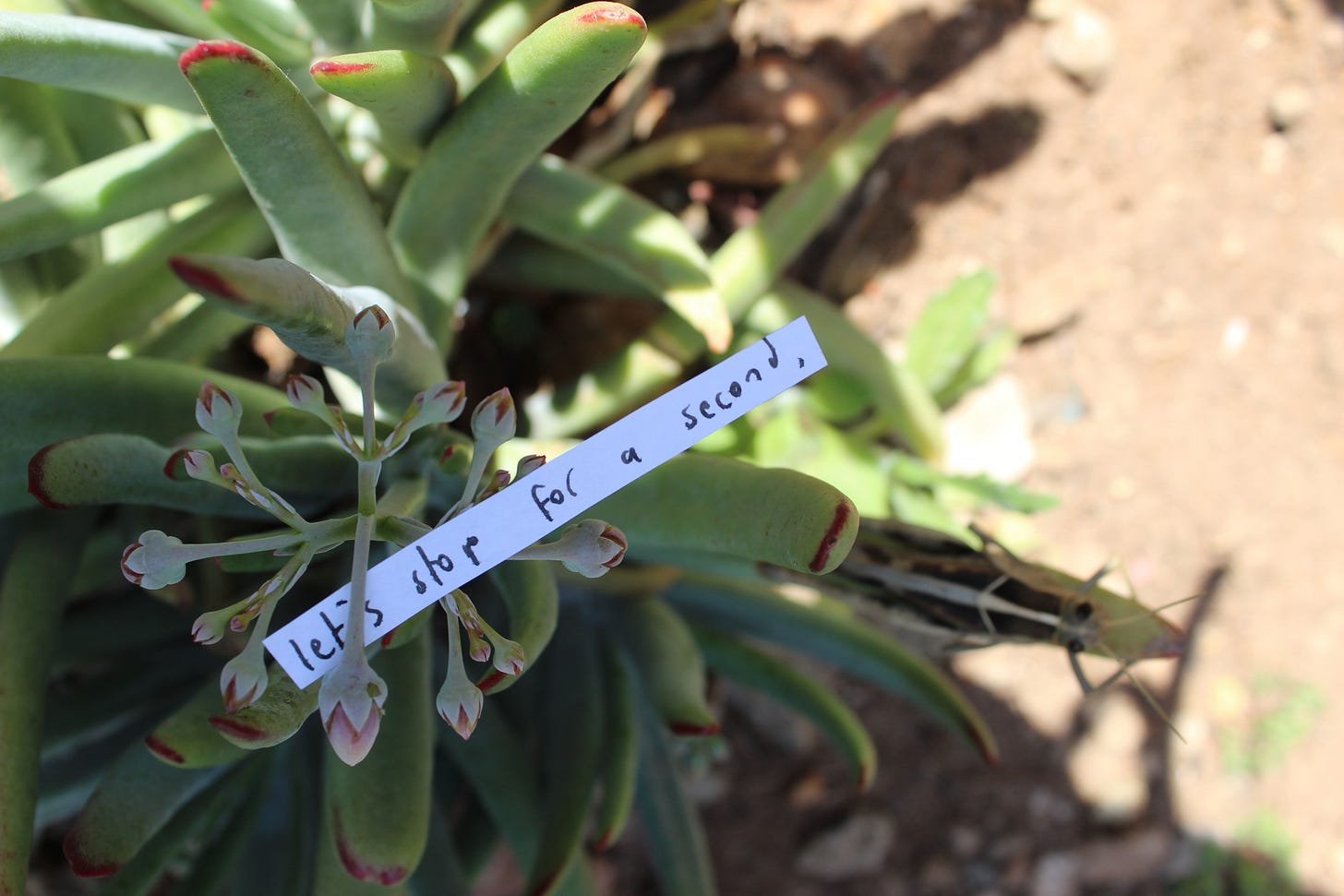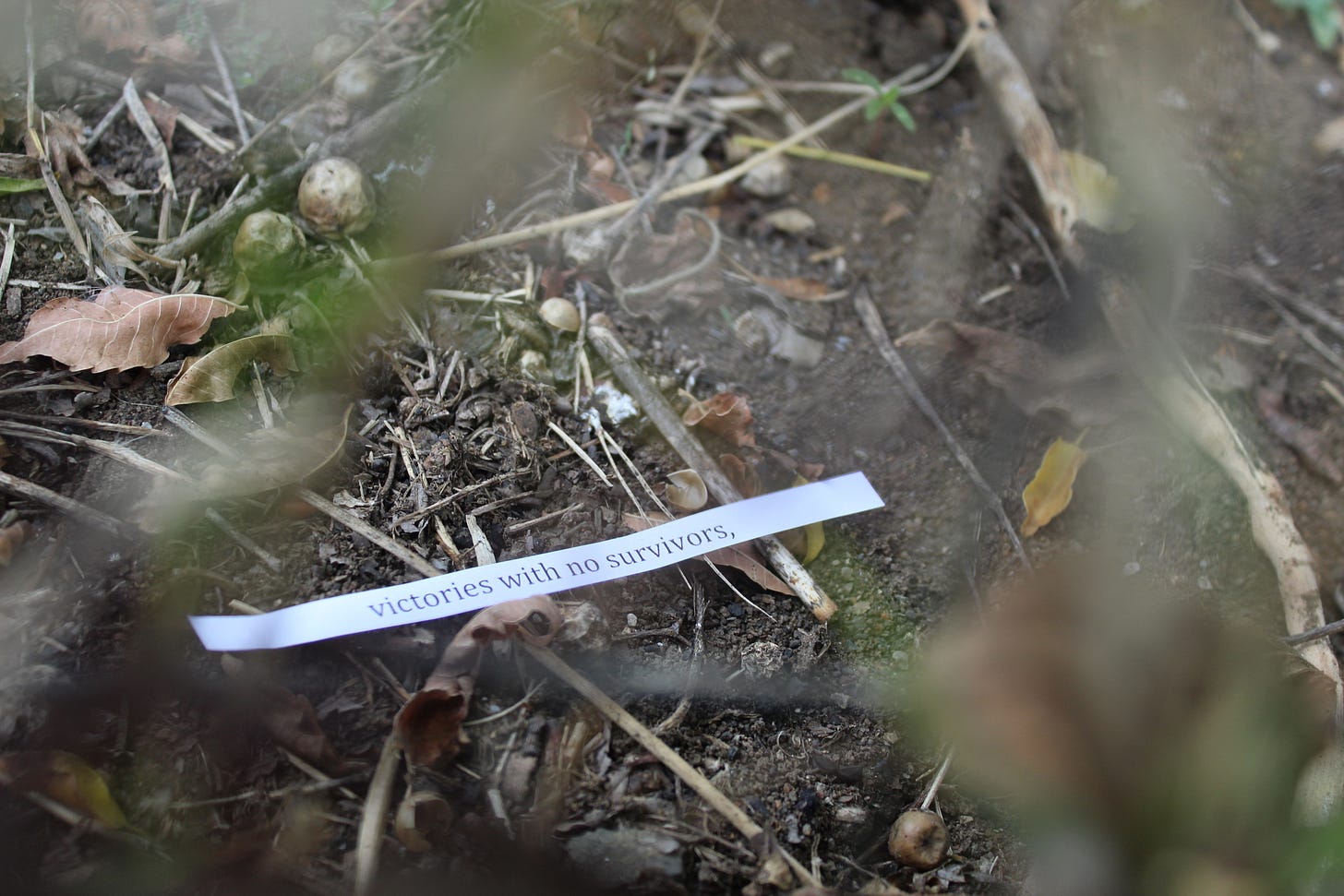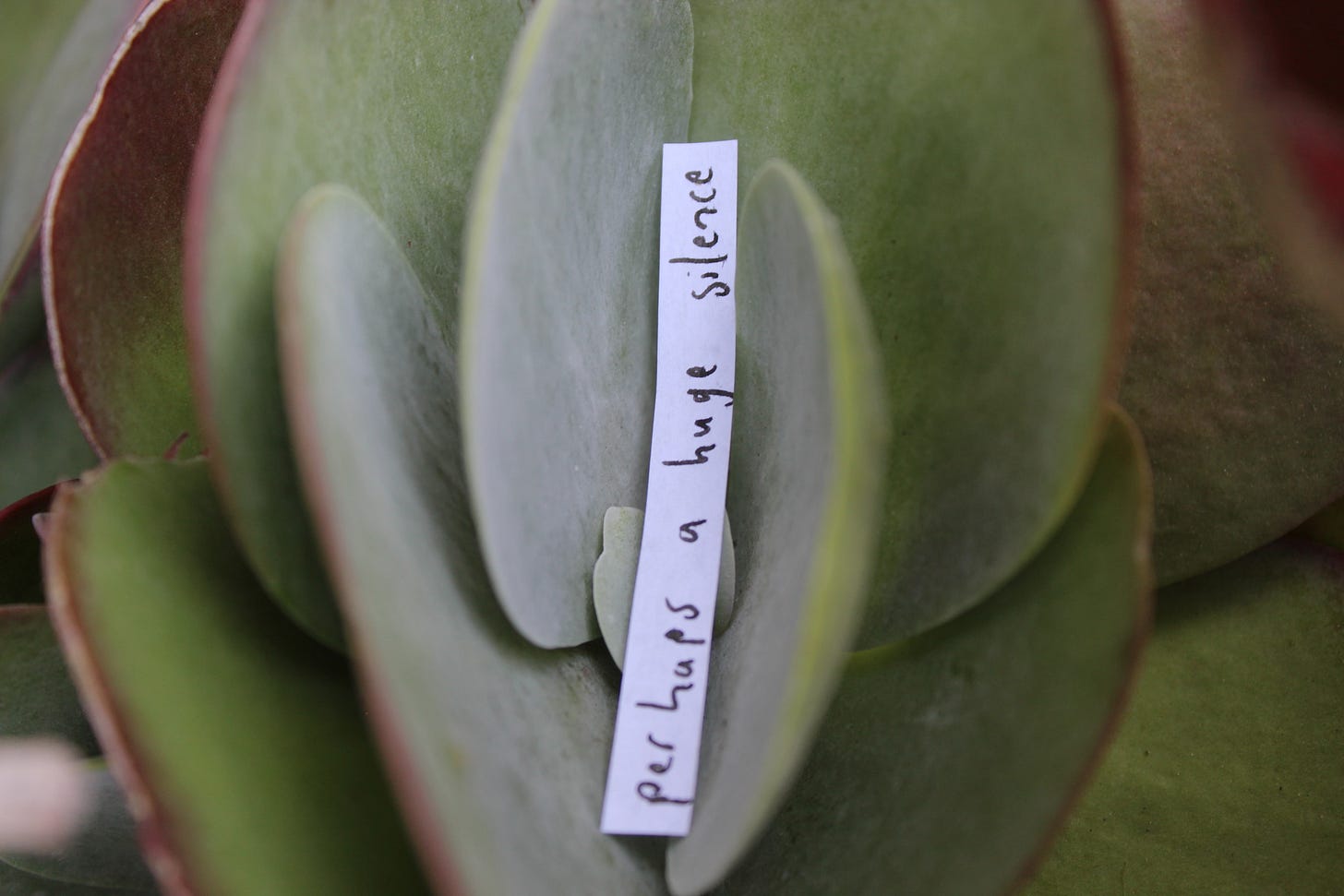I choose Fine Arts for my undergrad degree.
A purely selfish decision.
I’m not considering any consequences. Who cares whether I can find a job or not or actually make money…
The only bearable thing about high school has been a subject called ‘Visual Arts’ and so wherever I go next, if there’s more of this subject, I should be fine.
My prefrontal cortex is clearly not fully-developed yet.
A blessing.
At this point, I’m not thinking about utility. Not only in my choice of field as opposed to others, but also not in the possibilities within this field. It doesn’t occur to me to think about whether my art will be commercial or not; whether that’s something I might be interested in or be able to pull off.
This “art thing” is not a hobby though.
Although my mother clearly thinks so. She casually says while we’re driving home for one of my semester recesses, “You know, I’m still here and you can do anything with your life. Even if you decide you want to study something else after this, I’m here…”
Okay?
I’m already studying something, is this not a “real” degree?
Actually, I may even be complicit in this suspicion of my degree’s validity; when my classmates joke and say, “…Oh yeah, there’s people on this campus studying real degrees” I laugh along.
And we’re not pursuing a real degree?
“We’re studying to be unemployed” is wistfully thrown around every other day, and none of us objects to the other.
Second year. I am in a predicament.
I know unequivocally that I love making things and that it’s my way of transmitting some kind of value to the world, but how will I translate this to a “job?” The finish line of my studies is drawing nigh.
When this thought bothers me enough, I start looking for other degrees I could switch to for the certainly that I’ll get a real job when I graduate. Because where I am; “Fine Art,” can’t give me this certainty. I’m told artists don’t get jobs, that they just work in their studios or lecture in universities if they’re lucky. Most of them have no salaries or pension funds…they are unemployed.
I’m nervous. Everything in life seems to be about work…work that generates money.
Utility.
Is there a sphere of human activity, one might even say of human existence, that does not need to be justified by inclusion in a five-year plan and its technical organisation? Is there such a thing, or not?
The answer seems to be “no.”
I am enraged. Not at the world of work, but at artists not being part of it. Why is being an artist not conventionally considered “work?”
Studying art is actual work! Interpreting briefs, making art, working across different mediums, reading numerous unrelated theoretical sources, most of which are philosophical…it stresses us out! From the most lackadaisical of us to the most cool-headed; we’re all clearly being challenged here.
Not to mention the marks we get, most of which are just above the 50% mark.
This is real work. Hard work.
It’s “intellectual work.”
Josef Pieper explains this notion of “intellectual work” quite succinctly in Leisure: The Basis of Culture, 1952.
The statement that “knowledge is work” —because “knowing” is activity, pure activity—has two aspects: it expresses a claim on man and a claim by man. If you want to know something then you must work; in philosophy ‘the law is that reason acquires its possessions through work,’ that is the claim on man.”
So what we do really is work. All that philosophical theory accompanying the art; it’s labour, and it takes muscle.
When Kant speaks of philosophising as a “herculean labour,” he does not simply mean that it is characteristic of philosophising; he regards the labour involved as justification of philosophy: philosophising is genuine in so far as it is “herculean labour.”
I act out this visceral belief.
I feel better when I’m the last one in the studio, when I show up for all my theory modules and get distinctions for every written assignment.
I get annoyed when people say, “Oh you’re in Fine Arts, that’s chilled…my week has been so hectic!”
I’m enraged because MY week has been hectic! I have classes from 7 am, printmaking all day in the studio and tutoring in the afternoons; I have no open gaps during my day. Every day.
I’m an “intellectual worker.” I’m contributing something real to society, and I’m very busy to boot.
Work as it is understood in this phrase and context means the same thing as social service. “Intellectual work” in this context would mean intellectual activity in so far as it is a social service, in so far as it is a contribution to the common need.
My “work” problem is solved then. I’m an intellectual worker, I have some utilitarian function in the world. I am useful.
Happiness.
Wait.
Why do I have to be a “worker,” an instrument of utility? Why is that the only basis of a meaningful life. Is “intellectual worker” just my department in the great factory that is life?
What is meant is roughly this: like the wage-earner, the manual worker and the proletarian, the educated man, the scholar, too, is a worker, in fact an “intellectual worker,” and he, too, is harnessed to the social system and takes his place in the division of labour; he is allotted his place and his function among the workers; he is a functionary in the world of “total work”
You mean there’s nothing else? That anything not part of the great division of labour is just an insular, useless thing merely preoccupied with itself?
Useless navel-gazing in the name of “liberal arts?”
Yes.
Anything that does not translate to utility; to production and money, doesn’t serve “society” in any way.
…is there such a thing as a liberal art? The doctrine planners of the world of “total work” must answer “No.” The worker’s world, as Ernst Jünger puts it, is “the denial of free scholarship and inquiry.” In a consistently planned ‘worker’ State there is no room for philosophy because philosophy cannot serve other ends than its own or it ceases to be philosophy; nor can the sciences be carried on in a philosophical manner, which means to say that there can be no such thing as university (academic) education in the full sense of the word.
I am ridden with guilt.
Of course I want to be useful. I can’t just pursue something that is clearly for my own selfish pleasure and useless to anyone else, not with my conscience intact I can’t.
Can I at least just stop for a second? Stop trying to prove art and philosophical theory-work is a job, stop trying to prove that I’m a contributing, “responsible” member of the workforce?
Enter Pablo Neruda.
Now we will count to twelve and we will all keep still for once on the face of the earth, let's not speak in any language; let's stop for a second, and not move our arms so much. It would be an exotic moment without rush, without engines; we would all be together in a sudden strangeness. Fisherman in the cold sea would not harm whales and the man gathering salt would look at his hurt hands. Those who prepare green wars, wars with gas, wars with fire, victories with no survivors, would put on clean clothes and walk about with their brothers in the shade, doing nothing. What I want should not be confused with total inactivity. Life is what it is about; I want no truck with death. If we were not so single-minded about keeping our lives moving, and for once could do nothing, perhaps a huge silence might interrupt this sadness of never understanding ourselves and of threatening ourselves with death. Perhaps the earth can teach us as when everything seems dead and later proves to be alive. Now I'll count up to twelve and you keep quiet and I will go.
Can I make and contemplate what it means to be alive without forcing utility onto it?
Can I do it without being powered by the engine of Capitalism? Could this just be a gift, a delight; no effort or struggle? Pieper, after explaining the world of work, has an alternative for me. A different way of knowing, and working.
…just as the highest form of virtue knows nothing of “difficulty,” so too the highest form of knowledge comes to man like a gift —the sudden illumination, a stroke of genius, true contemplation; it comes effortlessly and without trouble.
In fact, he says, this “true contemplation” is the foundation of meaningful, and not solely utilitarian work.
It’s the way of leisure.
Not to be confused with languidness and “total inactivity” in Neruda’s words, but a more receptive and passive way of going about life.
…leisure in Greek is “skole,” and in Latin “scola,” the English “school.” The word used to designate the place where we educate and teach is derived from a word which means “leisure.”
What if we could pursue creative and intellectual pursuits not in “total work” world where everything is in a production line, but create out of leisure?
Leisure in this sense has nothing to do with being idle or “acedia” which referred to the sin of idleness in the Middle Ages, one of the seven deadly sins.
…acedia does not signify the “idleness” we envisage when we speak of idleness as “the root of all vice.” Idleness, in the medieval view, means that a [hu]man renounces the claim implicit in his human dignity…Acedia is the “despair from weakness” which Kierkegaard analysed as the “despairing refusal to be oneself.”
Leisure, as opposed to narrowing my capabilities to just utility.
Embracing all that makes me, essentially, me.
Leisure, it must be clearly understood, is a mental and spiritual attitude —it is not simply the result of external factors, it is not the inevitable result of spare time, a holiday, a weekend or a vacation. It is, in the first place, an attitude of mind, a condition of the soul, and as such utterly contrary to the ideal of “worker”
What if life wasn’t just about producing quantifiable commodities? Only stopping for brief, disembodied intervals?
…leisure stands opposed to the exclusive ideal of work qua social function. A break in one’s work, whether of an hour, a day or a week, is still part of the world of work. It is a link in the chain of utilitarian functions. The pause is made for the sake of work and in order to work, and a [hu]man is not only refreshed from work but for work.
From the polarity of; on the one side: wanting a job badly, to prove Art is actual work, and the other side: not wanting a job because it stops me from doing creative work which is what I actually want to do…
What if there was something in the middle, or outside of these polarities? Something beyond looking for utilitarian work or trying to justify my creative work with notions of utility? Something wholesome, something sustainable…where my life isn’t defined by “work” and “utility.”
Only in genuine leisure does a “gate to freedom” open. Through that gate man may escape from the “restricted area” of that “latent anxiety” which a keep observer has perceived to be the mark of the world of work, where “work and unemployment are the two inescapable poles of existence.”
Compared with the exclusive ideal of work activity, leisure implies (in the first place) an attitude of non-activity, of inward calm, of silence; it means not being “busy,” but letting things happen.
Leisure is not a “soft life” but welcomed fruition, letting things blossom from me
So, is this something you might be open to friend?
Not working to prove the worth of your existence, or working to prove your creative or intellectual work is worthwhile?
Leisure is not the attitude of mind of those who actively intervene, but of those who are open to everything; not of those who grab and grab hold, but of those who leave the reins loose and who are free and easy themselves —almost like a man falling asleep, for one can only fall asleep by “letting oneself go.”
Could we just not derive our concept of self, our “identity,” from the things we produce, and how useful they are?
And yet still produce things?
For me, this is the tricky part. It’s not that I want a life-long vacation, but I also don’t want a “dream job” where I sink below my self.
I keep falling prey to the polarity. Trying to bring productivity and utility into my art…trying to disjoin my art from the world and all usefulness. Beyond money, I find myself wanting my art and my writing to mean something important to someone somewhere, or not mean anything at all.
But at both ends of the spectrum, I found myself out of integrity.
What do I do, dear friend?
What I am proposing is not tapping out and leaving the game, if you will. I would find no pleasure in never doing anything again; never investing time and effort into creating things or unearthing hidden things.
But I don’t want to be enslaved to the outcomes.
Making, working…whatever you call it: it’s wonderful.
What’s better than reading a beautiful poem and turning it into a photography project? The pleasure of each successful photo…adding it to the next like weaving a beautiful tapestry of light.
Making things is a delightful experience.
But obsessing with their value is not.
I’ll leave you with Goethe in 1830:
I have never bothered or asked, in what way I was useful to society as a whole; I have contented myself with expressing what I recognised as good and true. That has certainly been useful in a wide circle; but that was not the aim; it was the necessary result.
I daresay my beautiful friend, pursue curiosity and delight.
Utility will take care of itself.
Yours,
Siphumelele.












